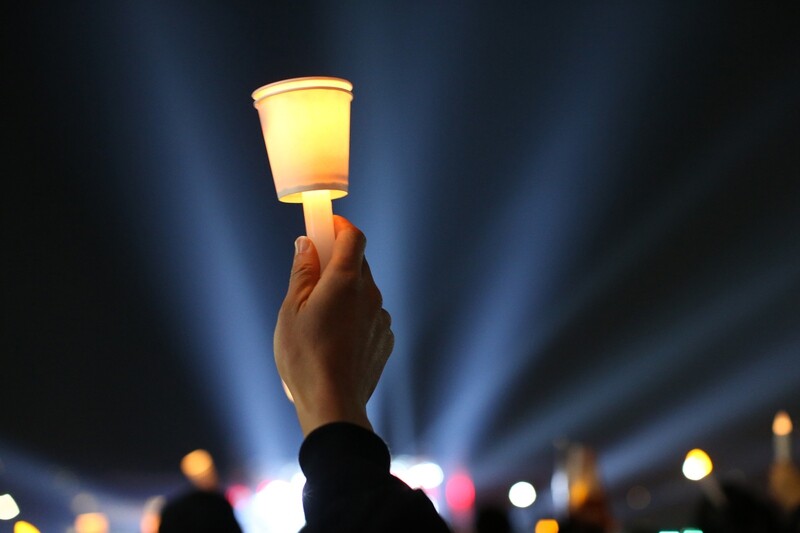hankyoreh
Links to other country sites 다른 나라 사이트 링크
Park’s impeachment named second most influential incident in shaping social consciousness

The impeachment of former President Park Geun-hye was named in a survey as the second most influential incident in South Korean history in terms of shaping the public’s social consciousness. The impeachment’s ranking – higher than either the Korean War (1950-1953) or the military coup of May 16, 1961 – suggests that the “candlelight revolution” that occurred around the end of last year has left a clear mark on South Koreans’ social consciousness. The top-ranked incident was Korea’s liberation from Japanese colonial rule on Aug. 15, 1945, while the Gwangju Democratization Movement of May 18, 1980, ranked third.
The Korea Democracy Foundation released results on Nov. 13 from a general survey of citizen consciousness held to mark the 30th anniversary of the June Democracy Movement of 1987. The findings showed high rates of positive assessment for the democratization movement across all generations and political affiliations. When asked to rate the effects of the movement on South Korean society, 65% called them “somewhat positive” and 23% “very positive” – indicating that a combined 88% of South Koreans view the results of the movement as positive. Evaluations were highly positive for respondents in their thirties (93%) and forties (93%), but also as high as 81% for those in their sixties.
Respondents also predicted the level of democracy in South Korea would continue to improve. When asked to predict the level of democracy in South Korea in ten years’ time, 52.9% of respondents said it would be “somewhat better” and 8.5% “considerably better.” Together, six out of ten respondents predicted improvements for democracy in South Korean society, while just 6.3% said it would be “somewhat worse” and 2% “considerably worse.” A relatively high percentage of conservatives and moderates predicted “little difference,” while many progressives were optimistic about improvements.
Assessments were also large positive for the social reforms underway since the Moon Jae-in administration took office. When asked to rate on a scale of one to five how helpful reform tasks in different areas would be for the development of democracy, respondents gave scores above the medium value of three for all areas, including “relieving social polarization in the areas of irregular employment and poverty” (3.29) and “guaranteeing political independence for the prosecutors, police, and other authorities” (3.27). Ratings were especially high for tasks related to the “eradication of deep rooted vices,” including “putting an end to government-business collusion” (3.49) and “eliminating corruption by vested interests and promoting social transparency” (3.37).
25.8% of survey respondents reported participation in one or more of the 20 candlelight demonstrations held to demand then-President Park Geun-hye’s resignation between Oct. 29, 2016, and Mar. 11, 2017. The average number of demonstrations attended was 2.57, with the largest number of respondents participating once (38.7%), followed by twice (27.6%), three times (18%), five times (6.9%), and ten times (3.1%). According to statistics, a total of 17 million people attended the demonstrations.
Around eight out of ten respondents said they supported amendment of the Constitution, which the National Assembly has formed a special committee to discuss. A majority of 64% supported instituting a four-year presidential term with the possibility of one re-election, followed by a semi-presidential system (23%), parliamentary system (12%), and “other” (1%).
For the survey, the research team of Korea University sociology professor Chung Il-joon commissioned the polling organization Korea Research to interview 1,012 adult men and women over 20 nationwide between July 6 and Aug. 7. The margin of error was ±3.7% with a 95% confidence level.
By Jang Su-gyung, staff reporter
Please direct questions or comments to [english@hani.co.kr]

Editorial・opinion
![[Column] Has Korea, too, crossed the Rubicon on China? [Column] Has Korea, too, crossed the Rubicon on China?](https://flexible.img.hani.co.kr/flexible/normal/500/300/imgdb/original/2024/0419/9317135153409185.jpg) [Column] Has Korea, too, crossed the Rubicon on China?
[Column] Has Korea, too, crossed the Rubicon on China?![[Correspondent’s column] In Japan’s alliance with US, echoes of its past alliances with UK [Correspondent’s column] In Japan’s alliance with US, echoes of its past alliances with UK](https://flexible.img.hani.co.kr/flexible/normal/500/300/imgdb/original/2024/0419/2317135166563519.jpg) [Correspondent’s column] In Japan’s alliance with US, echoes of its past alliances with UK
[Correspondent’s column] In Japan’s alliance with US, echoes of its past alliances with UK- [Editorial] Does Yoon think the Korean public is wrong?
- [Editorial] As it bolsters its alliance with US, Japan must be accountable for past
- [Guest essay] Amending the Constitution is Yoon’s key to leaving office in public’s good graces
- [Editorial] 10 years on, lessons of Sewol tragedy must never be forgotten
- [Column] A death blow to Korea’s prosecutor politics
- [Correspondent’s column] The US and the end of Japanese pacifism
- [Guest essay] How Korea turned its trainee doctors into monsters
- [Guest essay] As someone who helped forge Seoul-Moscow ties, their status today troubles me
Most viewed articles
- 1[Column] The clock is ticking for Korea’s first lady
- 2After 2 months of delayed, denied medical care, Koreans worry worst may be yet to come
- 3Samsung barricades office as unionized workers strike for better conditions
- 4[Column] Has Korea, too, crossed the Rubicon on China?
- 5[Correspondent’s column] In Japan’s alliance with US, echoes of its past alliances with UK
- 6Hong Se-hwa, voice for tolerance whose memoir of exile touched a chord, dies at 76
- 7All eyes on Xiaomi after it pulls off EV that Apple couldn’t
- 8US overtakes China as Korea’s top export market, prompting trade sanction jitters
- 9[Editorial] When the choice is kids or career, Korea will never overcome birth rate woes
- 10[Photo] Smile ambassador, you’re on camera